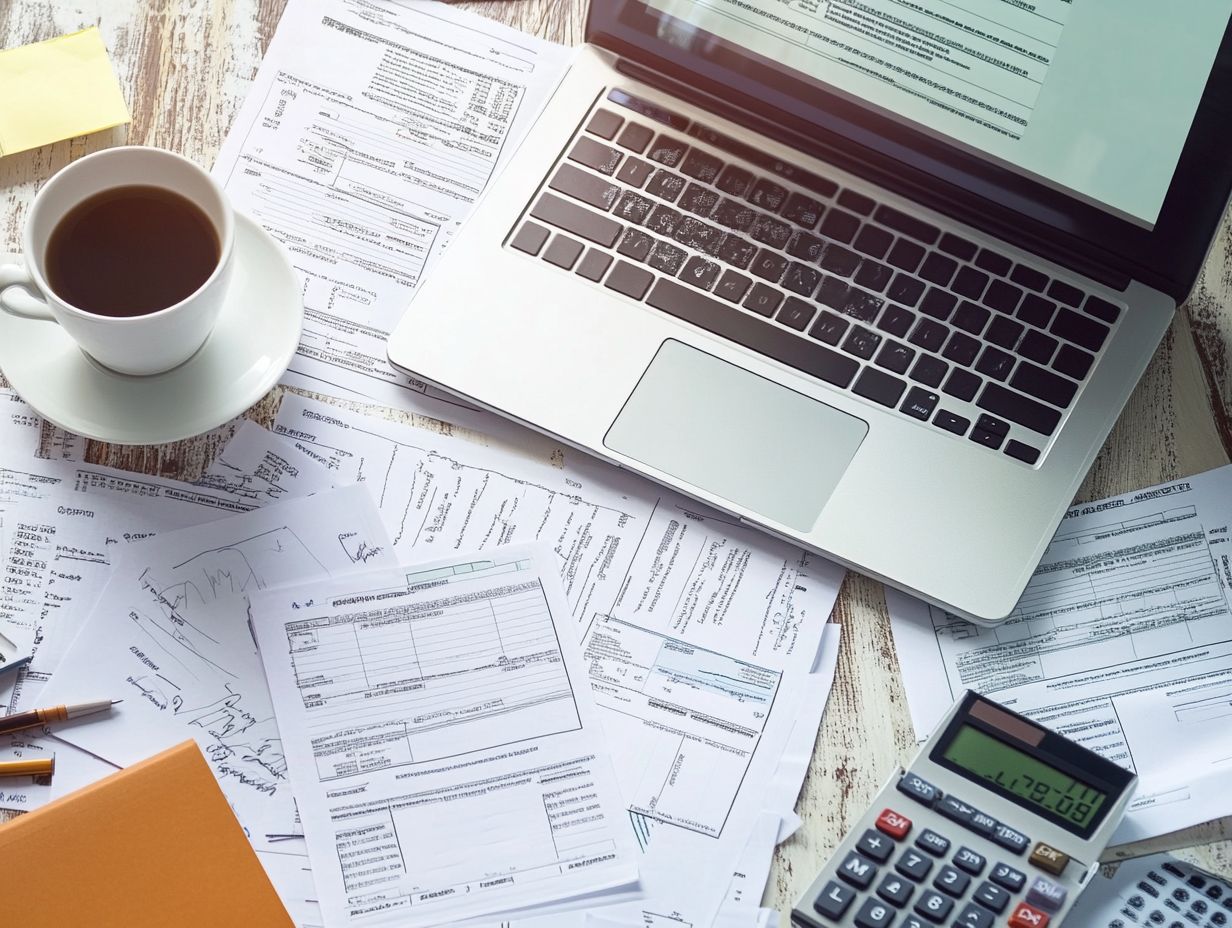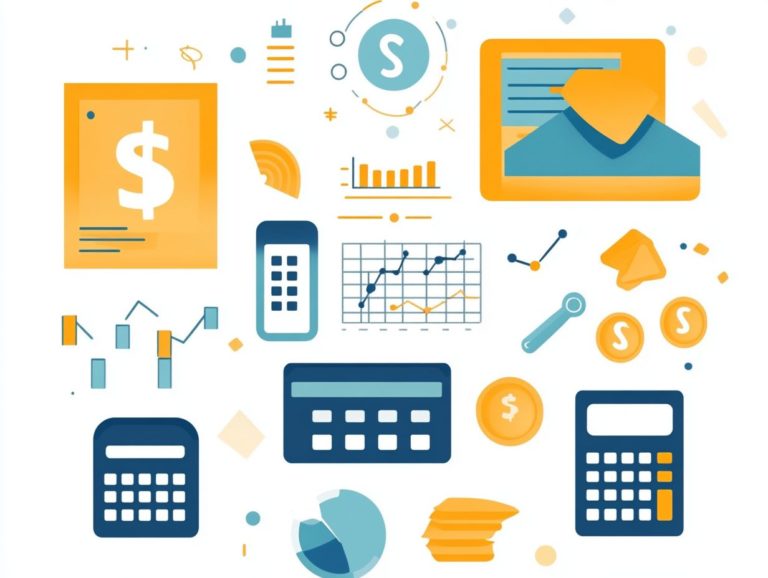Understanding Self-Employment Tax Obligations
Self-employment tax is a tax that you must pay when you work for yourself. If you’re freelancing, contracting, or running a small business, this tax applies to you.
This article provides a comprehensive overview of self-employment tax, covering topics such as:
- What it is
- Who is responsible for paying it
- How to calculate and report it
- Available deductions and credits
- Tips for avoiding common mistakes related to self-employment tax
Contents
Key Takeaways:
- Self-employment tax is a tax paid by individuals who work for themselves, including freelancers and independent contractors.
- Not everyone is required to pay self-employment tax. The criteria for paying this tax can include annual income and type of work.
- It’s important to accurately calculate self-employment tax using the correct formula and tax rates to avoid potential penalties and fines.
What is Self-Employment Tax?
Self-Employment Tax refers to contributions to Social Security and Medicare that self-employed individuals, including freelancers, sole proprietors, and independent contractors, must pay. This tax ensures that these workers receive benefits upon retirement or in the event of disability. It’s a key part of your tax strategy as a self-employed person.
Understanding the self-employment tax is crucial for good money management and compliance with IRS rules and regulations. It helps you meet your tax obligations.
Definition and Purpose
The self-employment tax funds Social Security and Medicare, making sure that self-employed individuals receive these essential benefits. This tax collects Social Security and Medicare contributions from people who do not have an employer withholding these taxes from their paychecks.
The IRS mandates that self-employed individuals pay into the Social Security and Medicare systems. Since you don’t receive these benefits through an employer, you must contribute directly to the system, similar to employed workers.
The main purpose of the self-employment tax is to ensure that self-employed individuals contribute to the same social support programs as employees and their employers. This fosters a balanced economic environment.
Who Needs to Pay Self-Employment Tax?
Self-employment tax is levied on various workers, including freelancers, independent contractors, and sole proprietors, who engage in business activities and earn income through self-employment. Understanding the requirements for self-employment tax is vital for complying with federal tax laws and making accurate estimated payments to the IRS.
Generally, individuals with net earnings of $400 or more from self-employment must file and pay self-employment taxes. However, specific criteria and exceptions may apply.
Criteria and Exceptions
You must pay self-employment tax if your net earnings exceed a certain threshold, although there are exceptions, such as tax-exempt church income. Typically, individuals with net earnings above $400 from self-employment are required to pay this tax, which funds Social Security and Medicare benefits.
If you earn below this amount, you are usually exempt from these additional taxes. Some religious groups and their members may qualify for exemptions based on their beliefs, impacting their self-employment tax obligations.
By understanding the requirements for these taxes and their exemptions, you can effectively manage your financial responsibilities and potentially lower your tax rates. This ensures regulatory compliance while maximizing your business income.
Understanding your tax obligations now can save you from penalties later! If you want to learn more about self-employment tax and how to prepare for it, take action today.
Calculating Self-Employment Tax
Self-employment tax is calculated by determining the amount of money you earn when you work for yourself and applying the relevant IRS tax rates. This tax matters for self-employed individuals as it directly impacts their estimated tax payments and overall financial planning.
To calculate self-employment tax liabilities, use IRS Form 1040 and Schedule SE. When filled out correctly, these forms ensure that the appropriate federal taxes are paid.
Formula and Tax Rates
The self-employment tax rate is 15.3%, which combines FICA taxes for Social Security and Medicare. This rate involves several steps outlined in Schedule SE.
It consists of 12.4% for Social Security (up to a specified income cap) and 2.9% for Medicare, which applies to all income. An extra 0.9% Medicare surtax may apply to individuals earning above a certain threshold.
Understanding these components is important as they constitute a significant portion of federal revenues and affect the overall tax burden on self-employed individuals. By accurately determining your self-employment tax, you can better manage your finances and ensure compliance with tax laws.
Reporting Self-Employment Tax
Getting your self-employment tax reporting right is key to staying on track with IRS requirements. This is accomplished by filing IRS Form 1040 and Schedule SE by the specified deadline.
Self-employed taxpayers should be mindful of tax filing dates to ensure proper reporting of self-employment tax, avoiding potential penalties and interest.
Proper reporting not only fulfills tax obligations but also helps calculate adjusted gross income, which is crucial for determining eligibility for various tax credits and deductions.
Forms and Deadlines
The primary forms for reporting self-employment tax are IRS Form 1040 and Schedule SE. Both must be submitted by the tax filing deadline to ensure compliance.
Taxpayers earning income as freelancers or independent contractors should diligently track their earnings and expenses throughout the year.
Typically, these individuals file their taxes annually by the April 15 deadline. Extensions may be available, allowing taxpayers to file by October 15 if necessary. Remember, extensions only give you extra time to file, not to pay!
Understanding the impact of self-employment income on overall tax liability can aid in preparing for upcoming financial obligations using effective tax strategies.
Deductions and Credits for Self-Employment Tax
Self-employment taxes can be a significant burden for freelancers, contractors, and sole proprietors. Understanding various tax-saving strategies can help maximize your savings.
Self-employed individuals can benefit from deductions related to business expenses. These often represent the largest costs in their tax preparation. For instance, costs for your home office or tools you need can all count as necessary and ordinary costs incurred during the course of conducting business.
Tax credits such as the Earned Income Tax Credit and the Employment Tax Credit can lower your overall tax liability by reducing the amount of tax owed.
Maximizing Tax Savings
Self-employed individuals can maximize their tax savings by implementing effective tax strategies. This includes understanding the tax deductions and credits available to them and collaborating with a financial advisor for personalized guidance.
Such collaboration helps individuals recognize deductible expenses—such as home office costs, travel, and equipment purchases. It also ensures awareness of applicable tax credits for which they may qualify.
By maintaining detailed records and preparing documentation throughout the year, self-employed individuals can significantly reduce their taxable income. Prioritizing tax preparation services is essential, as tax experts can uncover strategies and options that individuals might overlook, ultimately leading to better financial outcomes.
Don’t leave money on the table! Consult a tax expert today to maximize your savings.
Common Mistakes to Avoid
Avoiding common mistakes in tax for self-employed people is crucial for evading penalties and ensuring compliance with the tax requirements set by the IRS. Many self-employed people encounter challenges when filing their taxes. This can result in errors that increase their overall tax liabilities. Avoid these mistakes and save yourself from costly penalties!
By understanding these common pitfalls, freelancers and small business owners can more effectively and safely manage their tax filings.
Tax Filing Errors and Penalties
Tax filing errors can lead to severe penalties from the IRS. This is particularly true for self-employed people who may find it challenging to make accurate estimated tax payments throughout the year, which are predicted tax amounts you pay throughout the year. These mistakes often stem from miscalculating deductions, failing to report all sources of income, or missing deadlines for filing.
Along with incurring substantial tax penalties, such errors can trigger an audit, causing further stress for the taxpayer. To reduce these mistakes, keep accurate records and consult tax professionals when in doubt. Tax preparation software can help you identify potential errors before they occur.
Frequently Asked Questions
What is self-employment tax?
Self-employment tax is a tax that people pay when they work for themselves rather than for a company. It is also known as the SE tax and is used to fund Social Security and Medicare.
Who is considered self-employed?
People who work for themselves, either as a sole proprietor, independent contractor, or freelancer, are considered self-employed and are subject to self-employment tax.
How is self-employment tax calculated?
Self-employment tax is calculated by multiplying your net self-employment income by the self-employment tax rate. The rate is currently 15.3%, which is comprised of 12.4% for Social Security and 2.9% for Medicare.
Do I have to pay self-employment tax if I have a side gig?
If you earn more than $400 from self-employment income, you are required to pay self-employment tax. This includes income from a side gig or freelance work.
Can I deduct self-employment tax on my taxes?
Yes, self-employment tax is deductible on your federal income tax return. You can deduct half of your self-employment tax as an adjustment to your income, which reduces your taxable income.
What happens if I don’t pay self-employment tax?
Wondering what happens if you skip self-employment tax? Here’s the scoop: If you are required to pay self-employment tax and do not, you may face penalties and interest on the unpaid amount. It is important to stay compliant with your tax obligations to avoid any potential consequences.










